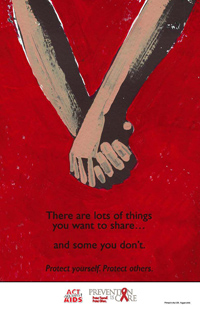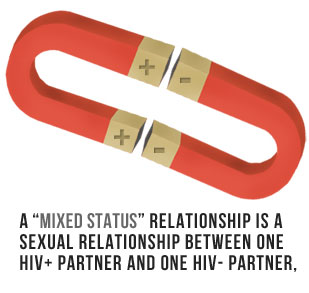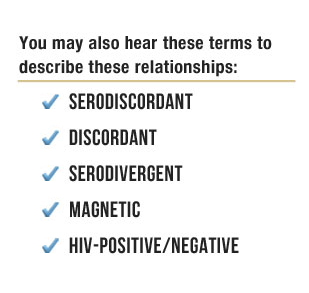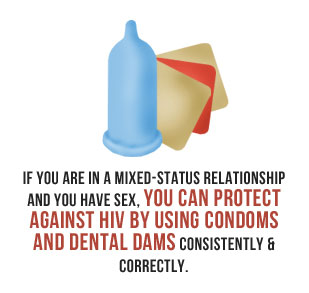What Is a “Mixed-Status” Relationship?
A "mixed-status" relationship is a sexual relationship between partners with different HIV statuses: one partner is HIV-positive and one is HIV-negative. This can involve a couple in a long-term relationship or a single encounter between two partners. You may also hear these terms to describe such relationships:
- Serodiscordant
- Discordant
- Serodivergent
- Magnetic
- HIV-positive/negative
Is It Safe for Mixed-Status Couples To Have Sex?

For mixed-status couples, the possibility of HIV infection is a constant reality. There is always a risk, but you can minimize it.
If you are in a mixed-status relationship and you have sex (anal, oral, or vaginal), you can protect against HIV and other sexually transmitted infections by using condoms and dental dams consistently and correctly. For more information on using condoms and dental dams, see AIDS.gov's Prevention: Safer Sex or the Department of Veterans Affairs' great, plain-language Tips for Using Condoms and Dental Dams.
If you are part of a mixed-status couple, it is important that you and your partner communicate openly and often about safer sex practices and HIV prevention. Healthcare providers and local HIV/AIDS organizations can be important sources of information and support for you and your partner.
If you are the HIV-positive partner in a mixed-status relationship, you can lower the risk of transmitting HIV to your partner if you are on antiretroviral therapy. Taking all your medications, on time, will help to lower the viral load in your body fluids and decrease the chance that you will transmit HIV to your partner. But remember, even if you have a low viral load, you can still transmit HIV to your sex partner. So it is important to always use a condom and practice safer sex. And, if you inject drugs, never share syringes, water, or drug preparation equipment with others since HIV-infected blood can be transmitted through them.
If you are the HIV-negative partner in a mixed-status relationship, talk with your partner about condoms and safer sex practices. If you are in an ongoing relationship with your partner, support him/her in taking all of his/her HIV medications at the right times. This "medication adherence" will lower his/her viral load and reduce the risk that HIV can be transmitted. You may also want to stay up-to-date on developments about pre-exposure prophylaxis (PrEP). Though researchers are not recommending PrEP be immediately used to prevent HIV infection, recent research findings suggest this may someday be another prevention method to be used with – not instead of – condoms, safer sex practices and other HIV prevention methods.
Fact Sheets & Print Materials
- Protect Yourself. Protect Others (PDF)
- AIDS InfoNet – Couples With Mixed HIV Status
 (PDF)
(PDF) - CDC – Oral Sex And HIV Risk (PDF)
- CDC - Pre-Exposure Prophylaxis (PDF)
Related Topics on AIDS.gov
Frequently Asked Questions
If my partner is HIV-positive and I'm not, can we still have sex?
Yes. If you follow safer-sex guidelines, you can minimize your chances of getting HIV from your partner. These guidelines include using condoms and dental dams consistently and correctly during anal, oral, and vaginal sex. If your partner is on antiretroviral therapy, this will also lower your risk of infection. Being informed and communicating openly with one another are keys to having a healthy sex life without transmitting the virus. For information on safer sex for HIV-positive people, see The Body's Safe Sex Advice For People With HIV.![]()
I'm HIV-negative and my partner is HIV-positive. Should I get regular HIV tests? If so, how often?
Yes. The CDC recommends that people who have a higher risk for HIV infection get tested at least once a year. Your healthcare provider may recommend that you be tested more often.
Is it okay to share sex toys with my partner?
No. Sharing sex toys increases your risk of getting or passing on sexually transmitted infections (STIs), including HIV. If you choose to share sex toys, you should cover the toy with a new condom for each use, clean the toy thoroughly (as directed on the packaging), and replace the condom with a new one before sharing it. If one or both of you has HIV or other STIs, it may be easier and safer to buy separate toys for yourself and your partner.
I'm part of a mixed-status couple. Can my partner and I have a baby without passing on HIV?
Mixed-status couples can have healthy children, but it's important to talk to a healthcare provider about what you can do to lower the risk of passing HIV to your baby or to the uninfected partner. The risks of transmitting HIV are different for men and women, and your provider can give you information to help you make the choice that is right for you. For more information, see The Body's Pregnancy In Serodiscordant Couples.![]()
Additional Resources
- CDC’s Dr. Kevin Fenton on CNN about PrEP -- After HIV pill news, now comes the tricky part
- CDC – Prevention Is Care campaign
- The Body – Resources for Mixed (HIV-Positive/Negative) Couples

- The Body – Serodiscordant Relationships

- The Body – Reproductive Options of HIV-Infected Patients

- Veterans Affairs – Tips for Using Condoms and Dental Dams
Last revised: 01/25/2012



